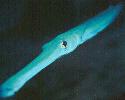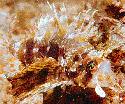 |
Family Synodontidae - lizardfishes
|
| Genera: Synodus |
 |
Family Muraenidae - moray eels
Key features: gill openings restricted to a small hole; pectorals and pelvics
absent; most with long fang-like teeth; nocturnal piscivores. |
| Genera: Gymnothorax |
 |
Family Aulostomidae - trumpetfishes
|
| Genera: Aulostomus |
 |
Family Fistulariidae - cornetfishes
|
| Genera: Fistularia |
 |
Family Holocentridae - squirrelfishes &
soldierfishes
Key features: squirrelfishes with a strong spine on the preoperculum (sometime
venomous) and a long anal spine; soldierfishes lack the preopercular spine and long anal
spine; both are nocturnal feeding on zooplankton associated with coral reefs; usually
found hiding in cracks and crevices on the reef during the day; some species make sounds
with specialized swimbladders. |
| Genera: Sargocentron, Neoniphon, Myripristis |
 |
Family Scorpaenidae - scorpionfishes
|
| Genera: Scorpaena, Iracundus, Scorpaenopsis |
 |
Family Serranidae - sea basses
Key features: opercle with three spines; spinous and soft dorsal fins
continuous; posterior soft dorsal and anal fin rounded; caudal fin usually rounded;
usually hermaphroditic with some species being functional hermaphrodites; can grow to 3 m
length and up to about 900 pounds but most species much smaller; frequently consume other
fishes. |
| Genera: Cephalopholis |
 |
Family Priacanthidae - bigeyes/glasseyes
|
| Genera: Priacanthus |
 |
Family Apogonidae - cardinal fishes
Key features: two separate dorsal fins; body spindle shaped; eyes large; most
species are nocturnal; most species are mouth brooders with either the male or female
doing the brooding depending upon species; feed on small invertebrates and fishes. |
| Genera: Apogon |
 |
Family Cirrhitidae - hawkfishes
|
| Genera: Cirrhitus, Paracirrhites |
 |
Family Lutjanidae - snappers
Key features: dorsal fins continuous or with shallow notch; caudal fin truncate
to deeply forked; moderately large mouth; enlarged canine teeth common; maximum size to
about 1 m; live near the bottom to 500 m depth; important food fishes but a common source
of ciguatera. |
| Genera: Lutjanus |
 |
Family Lethrinidae - emperors
Key features: dorsal fin continuous; only one species occurs in the Atlantic
Ocean; generalized carnivores; shy; highly prized food fish in some areas. |
| Genera: Monotaxis |
 |
Family Kyphosidae - chubs or rudderfish
|
| Genera: Kyphosus |
 |
Family Mullidae - goatfishes
|
| Genera: Mulloidichthys (Mulloides), Parupeneus |
 |
Family Chaetodontidae - butterflyfishes
Key features: body strongly compressed; mouth small, terminal, protractile;
brightly colored with vertical eye-strip common as well as "eyespot" near the
caudal peduncle; most species live in less than 20m of water, many butterflyfishes feed on
coral polyps and other small invertebrates without breaking off parts of the coral
skeleton; male-female pairing common. |
| Genera: Chaetodon, Forcipiger |
 |
Family Pomacanthidae - angelfishes
Key features: closely related to butterflyfishes; strong spine on the
preopercle; body compressed; many species brightly colored with adults and juveniles being
colored differently; shallow water residents (usually <20m); feed primarily on small
reef invertebrates. |
| Genera: Holacanthus, Centropyge |
 |
Family Pomacentridae - damselfishes
Key features: single nostril on each side, body usually compressed; depending
upon species food includes algae, small benthonic reef animals, and zooplankton; some
species territorial; parental care of eggs by males. |
| Genera: Abudefduf, Plectroglyphidodon, Stegastes,
Dascyllus, Chromis |
 |
Family Labridae - wrasses
Key features: Mouth protractile, jaw teeth usually separate; sexual dichromatism
and dimorphism common; important cleaner fishes; diet frequently contains benthonic
molluscs and crustaceans; some species are sequential hermaphrodites. |
| Genera: Cheilinus, Labroides, Bodianus, Coris,
Thalassoma, Gomphosus, Stethojulis, Halichoeres |
 |
Family Scaridae - parrotfishes
Key features: Mouth non-protractile, jaw teeth usually coalesced into beak;
sexual dichromatism and dimorphism common; some species are sequential hermaphrodites;
most species are herbivorous usually grazing on dead coral substrate and are hence an
important source of bioerosion on coral reefs. |
| Genera:
Chlorurus, Scarus |
 |
Family Acanthuridae - surgeonfishes
Key features: knife-like blade(s) on each side of the caudal peduncle; important
group of coral reef herbivores; some species territorial. |
| Genera: Acanthurus, Ctenochaetus, Naso, Zanclus,
Zebrasoma |
 |
Family Blennidae - blennies
Key features: scaleless; mouth not protractile; body tubular; head
blunt; some
species mimic other species; diet varies depending upon species; the family probably
includes many herbivorous species. |
| Genera: Exallias |
 |
Family Balistidae - triggerfishes
Key features: three dorsal spines;
plate-like scales; teeth large and few and
developed for crushing; many species eat sea urchins. |
| Genera: Melichthys, Rhinecanthus, Sufflamen, |
 |
Family Monacanthidae - filefishes
|
| Genera: Cantherhines, Pervagor |
 |
Family Ostraciidae - trunkfishes
Key features: body is encased in a bony carapace; no pelvic skeleton or spinous
dorsal; upper jaw not protractile; some species discharge ostracitoxin which is toxic to
other fishes. |
| Genera: Ostracion |
 |
Family Tetraodontidae - puffers
Key features: body inflatable;
scale-less or with short prickles on belly; four
fused teeth in jaws; lack ribs; flesh and especially viscera contains tetraodotoxin which
is highly toxic; eggs frequently toxic. |
| Genera: Arothron, Canthigaster |
 |
Family Diodontidae - porcupine fishes
|
| Genera: Diodon |
